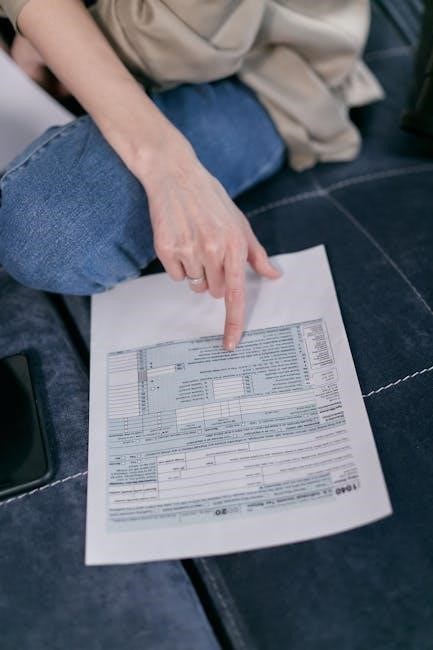Form 8621 is essential for reporting interests in foreign trusts and financial transactions, ensuring taxpayers comply accurately with U.S. tax laws and regulations.
1.1. Overview of Form 8621
Form 8621 is used to report certain transactions with foreign trusts and to claim any applicable deductions or credits related to foreign income. It applies to U.S. citizens, resident aliens, and non-residents who have financial interactions with foreign trusts. The form helps ensure compliance with U.S. tax laws, particularly for those with foreign financial interests. It requires detailed information about the trust, the taxpayer’s involvement, and the income or deductions associated with it. Accurate completion of Form 8621 is critical to avoid penalties and ensure proper reporting of foreign financial activities. It is a key component of international tax compliance for individuals and entities with cross-border financial dealings.
1.2. Importance of Accurate Filing
Accurate filing of Form 8621 is critical to ensure compliance with U.S. tax laws and avoid penalties. Errors or omissions can lead to fines, audits, and legal complications. Proper reporting demonstrates transparency and adherence to IRS regulations, reducing the risk of scrutiny. Timely and precise filing also ensures that taxpayers receive applicable credits or deductions related to foreign income. Inaccuracies can delay processing or result in additional taxes owed. Given the complexity of international tax rules, careful preparation and attention to detail are essential. Taxpayers must ensure all information aligns with IRS requirements to maintain compliance and avoid costly repercussions. Accurate filing safeguards against potential issues and upholds financial integrity.

1.3. Who Should File Form 8621
Form 8621 is required for U.S. citizens, resident aliens, and certain non-residents with interests in foreign trusts. Filers include beneficiaries of foreign trusts, grantors of foreign grantor trusts, and owners of foreign trusts with U.S. activities. Additionally, individuals with distributions from foreign trusts or who transfer property to foreign trusts must file. Businesses, estates, and trusts with foreign trust interests also need to submit this form. The IRS mandates filing based on income thresholds and specific financial interactions with foreign trusts to ensure compliance with international tax regulations. Accurate identification of filers is crucial to meet IRS requirements and avoid penalties.

Preparation Steps Before Filing
Before filing, gather all necessary documents, verify your filing status, and organize financial records to ensure accurate and efficient completion of Form 8621.
2.1. Gathering Necessary Documents
To accurately complete Form 8621, gather all relevant financial documents, including bank statements, trust agreements, and foreign tax returns. Ensure you have records of foreign income, deductions, and credits. Collect documents proving ownership or interest in foreign trusts or estates. Include receipts for foreign tax payments and any correspondence with foreign tax authorities. Organize currency exchange rate information to convert foreign amounts to U.S. dollars. Verify the accuracy of all documents to avoid errors or delays. Missing or incomplete documentation may lead to penalties or additional scrutiny from the IRS. Proper organization ensures a smooth and efficient filing process.
2.2. Understanding Filing Status
Understanding your filing status is crucial for accurately completing Form 8621. Your filing status determines how your income is reported and which deductions and credits you may claim. Common statuses include Single, Married Filing Jointly, Married Filing Separately, Head of Household, and Qualifying Widow(er). Each status has specific requirements and implications for foreign income reporting. Ensure you select the correct status based on your marital situation and residency. Misreporting your filing status can lead to errors or delays in processing. Review IRS guidelines or consult a tax professional to confirm your status. Accurate filing status ensures compliance with tax laws and avoids potential penalties or audits.

Filing Status and Eligibility
Understanding your filing status and eligibility is critical for accurately filing Form 8621. It determines reporting requirements and ensures compliance with U.S; tax laws.
3.1. Determining Your Filing Status
Determining your filing status is a critical step in preparing Form 8621. It involves assessing whether you are required to file based on your involvement with foreign trusts or assets. U.S. citizens, resident aliens, and certain non-residents with foreign trust interests must file. Key factors include ownership percentage, type of foreign trust, and the source of income. Accurate determination ensures compliance with U.S. tax laws and avoids penalties. Consult the form’s instructions or a tax professional to confirm your status and meet all requirements effectively.
3.2. Eligibility Criteria for Form 8621
Eligibility for filing Form 8621 is based on specific criteria related to foreign trust interests and financial transactions. U.S. citizens, resident aliens, and certain non-residents must file if they have ownership or control in a foreign trust. Key factors include the type of foreign trust, the nature of the income, and the taxpayer’s residency status. Additionally, thresholds for income or asset values may trigger filing requirements. It’s crucial to review the IRS guidelines to determine if your foreign activities meet the eligibility criteria for Form 8621, ensuring compliance and avoiding potential penalties for non-filing or incorrect reporting.
3.3. Special Considerations for Non-Residents
Non-resident individuals may need to file Form 8621 if they have certain interests in foreign trusts or engage in specific financial transactions. Key considerations include the source of income, residency status, and applicable tax treaties. Non-residents must report income from foreign trusts if it is effectively connected with a U.S. trade or business. Additionally, they may need to file other forms, such as Form 1040-NR, and provide documentation like Form W-8BEN. Tax treaties between the U.S. and the individual’s home country may also impact filing requirements. Non-residents should consult IRS guidelines or a tax professional to ensure compliance with all applicable rules and avoid penalties.
3.4. Joint Filing Requirements
Joint filing on Form 8621 may be required for taxpayers who share ownership or interests in foreign trusts or assets. This typically applies to spouses or business partners with shared financial obligations. Both parties must agree to file jointly and provide their respective Social Security numbers or Individual Taxpayer Identification Numbers (ITINs). Joint filers are equally responsible for ensuring the accuracy of the information reported. If one party fails to comply, the other may still be held liable for penalties. It is crucial to maintain clear documentation of joint ownership and ensure all parties understand their reporting obligations. Joint filing can simplify the process but requires careful coordination between all involved parties to avoid discrepancies or omissions.

Reporting Requirements
Form 8621 requires detailed disclosure of foreign trust interests, transactions, and related income, ensuring accurate reporting to comply with U.S. tax laws and avoid penalties.
4.1. Income Reporting on Form 8621
Accurate reporting of foreign trust income is crucial. filers must detail all income types, including distributions, gains, and dividends. Specify the source and nature of each income item. Include any foreign taxes paid or credits claimed. Ensure all amounts are reported in U.S. dollars, using appropriate exchange rates. Attach supporting documents, such as trust statements or foreign tax receipts, to validate the reported figures. Proper classification of income ensures compliance with IRS regulations. Errors or omissions may lead to penalties or delays. Always cross-reference with other sections of the form to maintain consistency in reporting.
4.2. Deductions and Credits Related to Foreign Income
Claiming deductions and credits on Form 8621 requires careful documentation. Eligible deductions include foreign taxes paid, administrative expenses, and certain losses related to foreign trust income. The Foreign Tax Credit is a key benefit, allowing taxpayers to reduce U.S. tax liability by the amount of foreign taxes paid. However, credits are subject to limitations based on taxable income. Properly categorize and support each deduction or credit with relevant receipts and statements. Ensure compliance with IRS rules to avoid disallowances. Accurate reporting is essential to maximize tax savings and maintain compliance with international tax regulations. Always cross-reference with other sections to ensure consistency in deductions and credits claimed.
Instructions for Each Section of Form 8621
Each section of Form 8621 provides specific instructions to guide taxpayers through accurate reporting, ensuring compliance with IRS requirements for foreign trust interests and transactions.
5.1. Part I: General Information
Part I of Form 8621 requires taxpayers to provide general information about themselves and the foreign trust. This includes the taxpayer’s name, address, and taxpayer identification number (TIN). Additionally, filers must identify the foreign trust by providing its name, address, and TIN, if applicable. This section also asks for the type of filing, such as whether it’s an initial return, amended return, or final return. Accurate reporting of this information is critical to ensure proper processing of the form. Taxpayers should carefully review the instructions provided by the IRS to ensure all required fields are completed correctly. Proper documentation is essential for compliance.
5.2. Part II: Income from Foreign Trusts
Part II of Form 8621 focuses on detailing the income received from foreign trusts. Taxpayers must report the type and amount of income, such as dividends, interest, capital gains, and royalties. They should also specify whether the income is taxable or deferred. Additionally, filers must identify the country where the trust is located and provide details about any distributions received. This section requires precise calculation to ensure accurate reporting of foreign income. Taxpayers should refer to the IRS guidelines for specific instructions on categorizing and reporting each type of income. Failure to report correctly may result in penalties or delays in processing the return.
5.3. Part III: Deductions and Credits
Part III of Form 8621 allows taxpayers to claim deductions and credits related to foreign trust income. Common deductions include foreign taxes paid, investment expenses, and administrative fees. Credits, such as foreign tax credits, may also be claimed to avoid double taxation. Each deduction and credit requires specific documentation, including receipts, invoices, and statements. Taxpayers must ensure all claims comply with IRS regulations and are properly substantiated. Accurate reporting is crucial to avoid penalties or delays. Filers should carefully review the instructions and consult a tax professional if unsure about eligibility or documentation requirements. Properly claiming deductions and credits can significantly reduce taxable income.
5.4. Part IV: Additional Information
Part IV of Form 8621 is designed to provide supplementary information that may not fit elsewhere on the form. This section allows taxpayers to explain unusual transactions, clarify discrepancies, or provide additional context. Filers may need to disclose details about foreign trust distributions, unusual income sources, or other relevant circumstances. Clear and concise language is essential to ensure the IRS can review the submission without confusion. Taxpayers should include only information directly related to the form and avoid unnecessary details. Accuracy in this section is critical to prevent delays or additional scrutiny. Use this space to address any unique situations or clarify ambiguous points from earlier sections.

Calculations and Schedules
Form 8621 requires precise calculations and accurate completion of schedules to ensure compliance with IRS regulations and proper reporting of foreign financial activities and income.
6.1. Calculating Total Income
Calculating total income for Form 8621 involves summing all foreign trust distributions, including income, capital gains, and other taxable amounts. Ensure accurate conversion of foreign currencies to U.S. dollars using the appropriate exchange rates. Include any income attributed to the trust that is considered taxable in the U.S. Net gains from the sale of trust assets should also be reported. Properly allocate income based on ownership percentage and ensure compliance with U.S. tax treaties. Double-check all calculations for accuracy to avoid errors or penalties. Consulting a tax professional may be beneficial for complex scenarios or large estates.
6.2. Completing Schedules A and B
Schedule A requires detailed reporting of income from foreign trusts, including dividends, interest, and capital gains. Ensure accurate categorization of each income type and proper conversion of foreign currencies. Schedule B focuses on deductions and credits related to foreign income, such as foreign tax credits or allowable expenses. Carefully list each deduction and ensure compliance with U.S. tax laws. Verify calculations to avoid errors. Properly allocate income and deductions based on ownership percentage. Ensure all figures align with the main form and supporting documents. Consulting a tax professional is recommended for complex cases. Double-check all entries to ensure accuracy and compliance with IRS requirements.

Attachments and Supporting Documents
All required attachments and supporting documents must be included to validate the information reported on Form 8621, ensuring compliance with IRS regulations and avoiding delays.
7.1. Required Attachments
When submitting Form 8621, certain attachments are mandatory to ensure compliance. These include statements from foreign trusts, detailed income summaries, and records of transactions. Additionally, any legal documents, such as trust agreements or beneficiary statements, must be attached if applicable. These attachments validate the information reported on the form and provide the IRS with necessary details to assess compliance. Failure to include required attachments may result in delays or penalties. Ensure all documents are properly organized and legible to avoid issues during processing. Attachments should be securely fastened to the form to prevent loss or separation during submission. Always verify the completeness of attachments before filing to ensure a smooth process.
7.2. Supporting Documentation
Supporting documentation is crucial for substantiating the information reported on Form 8621. This includes bank statements, invoices, contracts, and ledgers detailing foreign transactions. Maintain records of communications with foreign entities, such as trust agreements or beneficiary notifications. While these documents may not need to be filed with the form, they must be kept on hand for potential IRS review or audit. Proper documentation ensures compliance and avoids penalties. Clearly organize and store these records securely, as they may be requested to verify the accuracy of reported income, deductions, or credits. Failure to provide supporting documentation when requested can lead to delays or additional scrutiny. Always ensure records are complete, accurate, and easily accessible. This practice helps maintain transparency and satisfies regulatory requirements.

Submission and Filing
Submit Form 8621 to the IRS address listed in the instructions, ensuring the form is signed and complete. Incomplete forms may delay processing. Use certified mail for proof of filing. Include all required attachments and ensure the form is postmarked by the deadline. Electronic filing may also be an option, depending on IRS guidelines. Keep a copy for your records and verify receipt. Timely submission prevents penalties and ensures compliance with tax obligations. Always double-check the mailing address and filing requirements to avoid delays or rejection. Proper submission ensures smooth processing and reduces the risk of follow-up actions.
8.1. Where to File Form 8621
To file Form 8621, submit it to the appropriate IRS address based on your location. Use the IRS mailing address listed in the instructions for Form 8621. Ensure the form is properly addressed and mailed via certified mail with a return receipt for proof of filing. If filing electronically, follow the IRS e-file guidelines. Include all required attachments and ensure the form is complete and signed. Keep a copy for your records. Verify the IRS address before mailing to avoid delays. Proper submission ensures timely processing and reduces the risk of follow-up actions. Always double-check the mailing address and filing requirements to avoid rejection or penalties.
8.2. Deadline for Submission
The deadline for submitting Form 8621 is the same as the deadline for filing your individual tax return, which is typically April 15th. If you file for an automatic six-month extension, the deadline extends to October 15th. However, if you are filing Form 8621 with an amended return, the deadline is three years from the original filing date or two years from the date the tax was paid, whichever is later. Penalties may apply for late submissions, so ensure timely filing. Double-check the IRS website for any updates or changes to deadlines before submitting. Proper adherence to the deadline ensures compliance and avoids unnecessary delays or penalties.

Compliance and Penalties
Accurate and timely filing of Form 8621 is critical to avoid penalties, including fines and potential legal action for non-compliance with U.S. tax reporting requirements.
9.1. Importance of Timely Filing
Timely filing of Form 8621 is crucial for compliance with IRS regulations, ensuring accuracy and avoiding delays. Missing deadlines may result in penalties, fines, or legal actions. The IRS mandates strict adherence to filing timelines to maintain transparency and integrity in tax reporting. Failure to file on time can lead to additional scrutiny, potentially affecting your tax standing and future financial transactions. It is essential to prioritize timely submission to avoid complications and ensure seamless processing of your foreign trust interests. The deadline for filing is typically April 15th, with extensions available under specific conditions. Compliance demonstrates responsibility and adherence to U.S. tax laws.

9.2. Penalties for Non-Compliance
Failure to comply with Form 8621 requirements can result in significant penalties, including a $10,000 fine for failing to file or for filing incorrectly. This penalty may increase if the non-compliance continues beyond 90 days after receiving an IRS notice. Additional penalties, such as a 35% fine on unreported income or gains from foreign trusts, may also apply. The IRS may impose further penalties for willful neglect or fraud. These consequences highlight the importance of accurate and timely filing. Taxpayers must address any issues promptly to avoid escalating penalties. If penalties are assessed, taxpayers can request relief by demonstrating reasonable cause, supported by proper documentation.



